Emerging Disruptors in Smart Buildings
Delivered – Virtually
November 13, 2025
Welcome to the Emerging Disruptors in Smart Buildings Conference. Join investors, dealmakers and representatives from the building and construction industries. Listen to CEOs of some of the most dynamic building technology companies discuss their products, services and innovations. Don’t miss this opportunity to learn about groundbreaking developments shaping the future of smart buildings. Attend virtually on November 13, 2025.
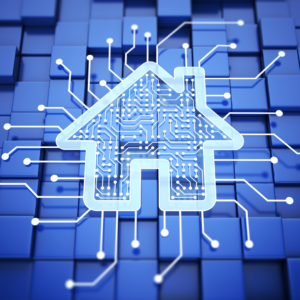
The global market for smart buildings was estimated to be between $87 billion and $108 billion. By 2030, the market is expected to reach at least $176.9 billion.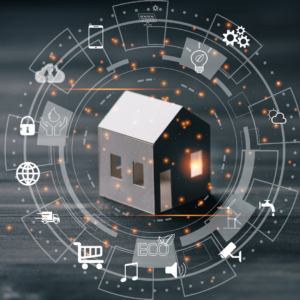
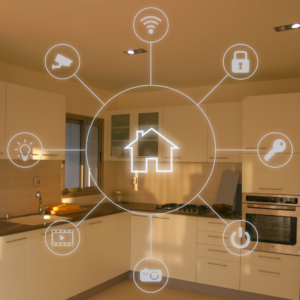 Key drivers for the growth of the smart building industry include:
Key drivers for the growth of the smart building industry include:
Energy Efficiency and Sustainability: Smart buildings optimize energy use through advanced technologies like IoT, AI, and energy management systems, reducing energy consumption and greenhouse gas emissions. Integration of renewable energy sources (e.g., solar panels) and compliance with green building standards like LEED further drive adoption.
Technological Advancements: The rise of IoT, AI, and cloud computing enables real-time monitoring, predictive maintenance, and automation of building systems such as HVAC, lighting, and security. IoT sensors provide detailed insights into energy performance, occupant behavior, and environmental conditions to enhance efficiency and comfort.
Cost Savings: Smart technologies reduce operational costs by improving energy efficiency, automating maintenance tasks, and extending the lifespan of building systems. Retrofitting older buildings with smart technologies offers significant cost-saving opportunities while enhancing sustainability.
Enhanced Occupant Experience: Smart buildings improve comfort through climate control, air quality monitoring, and personalized settings based on real-time data. Enhanced security features like IoT-enabled access controls provide safer environments for occupants.
Regulatory and Market Trends: Governments and organizations are increasingly mandating energy-efficient practices and promoting smart city initiatives, boosting the demand for smart building. The growing focus on decarbonization and zero-energy buildings aligns with global sustainability goals.
Here are specific examples of new smart building technologies:
AI-Driven Predictive Maintenance: AI algorithms integrated with IoT sensors detect anomalies in building systems, such as HVAC, refrigeration, and lighting, enabling proactive repairs before breakdowns occur. For example, AI can identify energy spikes or early signs of leaks in refrigeration units.
Real-Time Analytics: IoT-enabled real-time analytics systems collect data on temperature, occupancy, energy usage, and air quality to optimize building operations dynamically. These systems automatically adjust HVAC and lighting based on current conditions, reducing energy consumption and enhancing occupant comfort.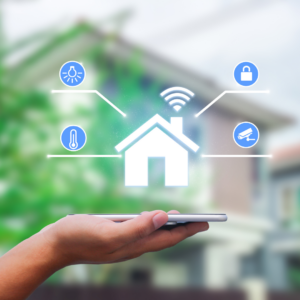
Smart Building Platforms: Platforms like Johnson Controls’ OpenBlue and Schneider Electric’s EcoStruxure provide comprehensive solutions for energy management, sustainability tracking, and operational efficiency. Notable features include automated lighting control, occupancy sensing, and cybersecurity monitoring.
Open-Source Automation Tools: Platforms like AGO Control and Domoticz offer customizable open-source solutions for automating building systems. These tools allow integration with IoT devices for flexible and cost-effective building management.
AI-Powered Fault Detection: Advanced AI systems analyze sensor data to detect faults in real time, pinpoint root causes, and suggest resolutions. For example, abnormal vibration patterns in HVAC units can be flagged for early intervention.
PEAK Real-Time Analytics Platform: The PEAK platform consolidates utility data from energy meters, HVAC systems, elevators, and lighting to monitor performance continuously. It uses AI to identify inefficiencies and anomalies across all connected systems.
In 2024, venture capital, private equity, and corporate backers invested $6.9 billion in startups focused on smart commercial buildings, marking the third-highest year for funding since 2015. This was spread across 279 funding rounds, a 17% increase from 2023.
Below are some of the smart building companies that received significant venture funding in early 2025:
| Company | Amount Raised | Investors |
| Beam | $11 million | RXR, Accel, and Teamworthy Ventures |
| Reneo | $45 million | Lakestar, Eurazeo, and Foundamental |
| Monograph | $20 million | Fifth Wall and Base10 Partners |
| Avani Solutions | $4.4 million | Fifth Wall and Base10 Partners |
Below are highlights of recent acquisitions in the smart building industry:
| Acquirer | Target | Description of Transactions |
Date of Transaction
|
|
Trane Technologies
|
BrainBox AI
|
BrainBox AI’s deep learning algorithms lower energy consumption by 25% and greenhouse gas emissions by 40%.
|
January 2025 |
| Ameresco | ASA Controls | Acquisition strengthens Ameresco’s smart building solutions team and expands its energy-efficient solutions. | March 2025 |
|
Johnson Controls’ R&L Commercial HVAC Business
|
Bosch Group
|
The exit value was $8.1 billion.
|
July 2024 |
|
LG Electronics
|
Athom
|
This acquisition aligns with Triton’s focus on building systems integration
|
2024 |
| Triton |
Bosch Security
|
$2.8 billion | Late 2024 |
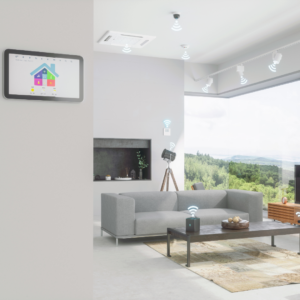
Each management team will discuss their company’s existing and forthcoming product offerings. They will apprise listeners of their addressable markets and expectations for customer segments served. They will inform us of their research and development efforts, proprietary technologies and patent portfolios. They will tell us about their business models including the extent of their collaborations, licensing strategies, distribution channels, expansion efforts, manufacturing strategies, milestones and exit strategies.
Please check back for the agenda of presenting companies. If you would like to nominate a company to present, please contact Gustavo Yrepa at gustavo@davosinthedesert.us.
Registration is free for members of Davos in the Desert. The registration price for non-members is just $10. Registration is for one attendee. No refunds.


